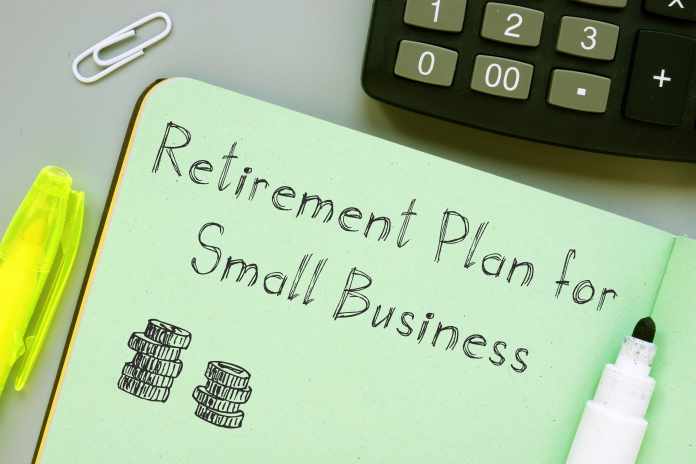Despite their size, small businesses also have goals and requirements to make sure that the business keeps running. These goals and requirements include making profits, expanding operations, paying taxes, complying with other regulations, and finally building a legacy.
The people who make this happen are the employees together with the business owner. As such, it’s imperative as a business owner to prioritize the concerns of your employees. It’d be best if you compensated them appropriately and even helped them save up for retirement.
There are various retirement plan services for small businesses. If you want to learn more about that, keep reading this article as it provides a detailed guide to understanding retirement plans for small businesses.

What Are The Retirement Plans For Small Businesses?
A small business retirement plan is a tax-deferred plan that allows small business owners and their employees to save for retirement. You use these retirement savings to meet your retirement goals depending on how you want your retirement life to be.
As people say, you retire from work, not life. This is how retirement planning benefits small business owners and their employees.
- They come through in case of an emergency. This is because you can use part of your retirement plan as emergency funds instead of depending on others for help.
- Retirement savings help you and your employee maintain your living standards even when you’re not working.
- Retirement savings help you leave a legacy. Part of the reason people work hard is to ensure that their families live their desired lives. Retirement savings will help you provide excellent life for your loved ones even in your absence.
- Investing in your retirement savings will also help you curb inflation as prices of goods tend to increase as days pass by.
Now that you know what a retirement plan for small businesses is and some of its benefits, here are the steps to taking it;
Steps Used In Retirement Planning For Small Businesses
- Figure Out How Much You Should Save
Most people don’t think about how their lives will be when they’re old. This results in a lack of retirement savings; hence, you depend on others for support in your golden years. Thinking about how you’d want your life to be after retirement will help you determine how much money you should save.
Next, consider the costs you’ll need to achieve that life. These costs include healthcare, housing, entertainment, travel, and many more. It’s essential to estimate higher prices because of inflation. Lastly, consider how much you get from your small business, what percentage of your income you’d have to save, and how long it’ll take to achieve the estimated amount. Alternatively, if you aim to sell or pass your business along to family, you’ll be relying on savings, investments, and social security. Social security can be a confusing and frustrating to understand, so take a look at this social security guide if you’d like more info.
In addition, if you have employees in your small business, it’s good to ask them how they feel about contributing to their income retirement plan. This information will help choose a retirement strategy.
- Determine The Best Retirement Strategy For Your Business
Various retirement strategies are suitable for different situations. The following are some retirement plans you can use in your business:
- Payroll Deduction Individual Retirement Account (IRA) – this plan is preferred by some employers with small businesses because they don’t have to contribute to their employees. These deductions are made using Roth IRA employee dollars. Efficiently managing these deductions and ensuring accurate payroll processing is crucial for both employers and employees. A paystub generator can be an invaluable tool in this process, providing clear and precise documentation of each employee’s earnings and deductions. This not only simplifies the payroll process but also helps in maintaining transparency and accuracy in financial records, essential for any small business.
- Savings Incentive Match Plan For Employees (SIMPLE) IRA – this plan is preferred because it has matching requirements and lower contributions than other plans, which is fit for some small businesses. However, it offers an option of contributing more if you can.
- 401 (k) – this plan has three forms: traditional, safe harbor, or solo. The traditional 401 (k) is the most preferred plan as it allows you to choose between Roth and pre-tax contributions, take loans from your retirement savings, and contribute a higher amount to your retirement savings account. Safe harbor differs from traditional 401 (k) in that it requires you to contribute to your employees’ retirement accounts. On the other hand, solo 401 (k) is for business owners who want to contribute as much as possible. Additionally, these 401 (k) forms are for business owners who don’t have employees. However, you can contribute with your spouse.
- Simplified Employee Pension (SEP) IRA – Small businesses have high and low seasons like any business. It might be inconvenient to contribute toward your retirement account during low seasons. This retirement plan allows you to contribute during high seasons when you make high profits. This makes it easy to maintain because you won’t be under the pressure of making annual contributions.
- Profit-sharing Plan – the decision to share your profits is made every year. This means you don’t have to share your profits every year. This plan is complex at times, and it has regulations regarding withdrawals, vesting, and eligibility.
Moreover, these retirement plans have different procedures for setting them up. For example, setting up a SIMPLE IRA involves the following steps:
- First, you need to select a financial institution that will act as a trustee. Your financial institution could be an insurance company, bank, or credit union. You can also let your employees select their own.
- Next, have a written agreement with your employees depending on whether you’ll use the same or different financial institutions.
- Inform your employees about the employer matching and the chance to change or decide the contribution amount.
- The next step involves providing a summary plan received from your chosen financial institution(s).
- Lastly, set up a SIMPLE IRA for all your employees.
The above procedure is different from the procedures in other retirement plans for small businesses; some plans have more complicated steps while others have easier ones.
Factors To Consider When Setting Up A Retirement Plan
The following are factors you should keep in mind concerning retirement plans for your small business:
- Start saving for retirement as early as possible. This is because the earlier you start, the more you save for your retirement life.
- Direct some of your savings towards paying your debts, especially those with high-interest rates. This will reduce the chances of liabilities in the future.
- It’d help if you also considered checking for tax efficiency regarding how your returns will be taxed.
- Lastly, you may want to change your investment to low-risk options as you get closer to your retirement to avoid inconveniences.
Summing It Up!
The size of your business shouldn’t influence your decision to have a retirement plan. This is because retirement plans are essential for your future life as they’ll cater to all your needs. Before you start saving for retirement, it’s good first to understand what small business retirement plans are, the various types, and what they involve. You can use this article as a guide if you’ve just started your small business or feel you’re not well conversant with the topic of retirement plans. By doing so, you’ll be in a better position to choose the best retirement plan for your small business.





